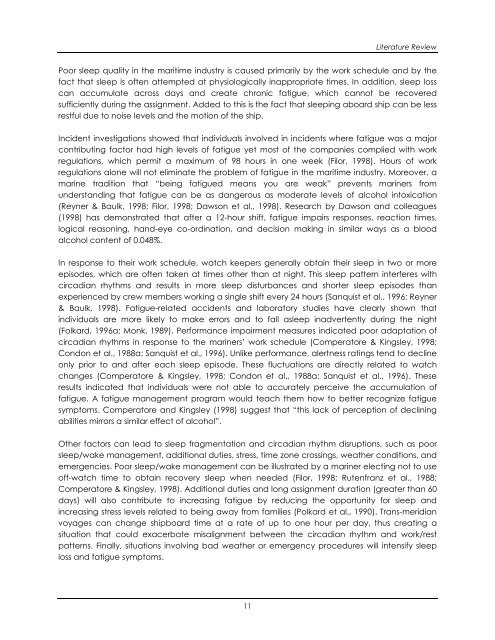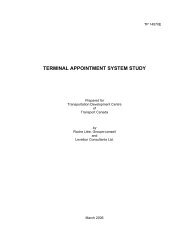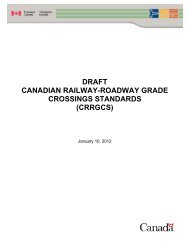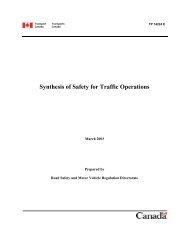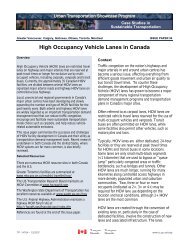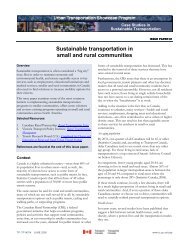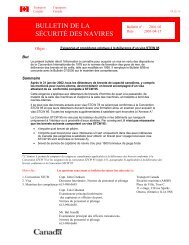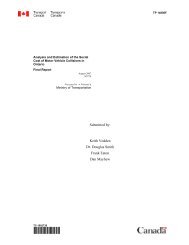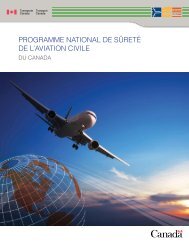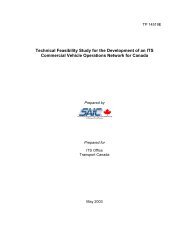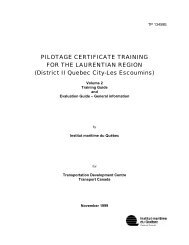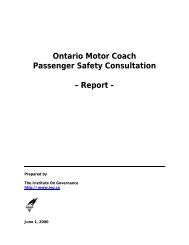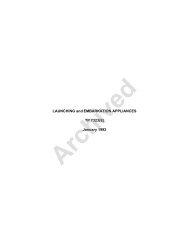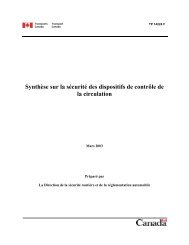Fatigue Management Program for Canadian Marine Pilots
Fatigue Management Program for Canadian Marine Pilots
Fatigue Management Program for Canadian Marine Pilots
You also want an ePaper? Increase the reach of your titles
YUMPU automatically turns print PDFs into web optimized ePapers that Google loves.
Literature Review<br />
Poor sleep quality in the maritime industry is caused primarily by the work schedule and by the<br />
fact that sleep is often attempted at physiologically inappropriate times. In addition, sleep loss<br />
can accumulate across days and create chronic fatigue, which cannot be recovered<br />
sufficiently during the assignment. Added to this is the fact that sleeping aboard ship can be less<br />
restful due to noise levels and the motion of the ship.<br />
Incident investigations showed that individuals involved in incidents where fatigue was a major<br />
contributing factor had high levels of fatigue yet most of the companies complied with work<br />
regulations, which permit a maximum of 98 hours in one week (Filor, 1998). Hours of work<br />
regulations alone will not eliminate the problem of fatigue in the maritime industry. Moreover, a<br />
marine tradition that “being fatigued means you are weak” prevents mariners from<br />
understanding that fatigue can be as dangerous as moderate levels of alcohol intoxication<br />
(Reyner & Baulk, 1998; Filor, 1998; Dawson et al., 1998). Research by Dawson and colleagues<br />
(1998) has demonstrated that after a 12-hour shift, fatigue impairs responses, reaction times,<br />
logical reasoning, hand-eye co-ordination, and decision making in similar ways as a blood<br />
alcohol content of 0.048%.<br />
In response to their work schedule, watch keepers generally obtain their sleep in two or more<br />
episodes, which are often taken at times other than at night. This sleep pattern interferes with<br />
circadian rhythms and results in more sleep disturbances and shorter sleep episodes than<br />
experienced by crew members working a single shift every 24 hours (Sanquist et al., 1996; Reyner<br />
& Baulk, 1998). <strong>Fatigue</strong>-related accidents and laboratory studies have clearly shown that<br />
individuals are more likely to make errors and to fall asleep inadvertently during the night<br />
(Folkard, 1996a; Monk, 1989). Per<strong>for</strong>mance impairment measures indicated poor adaptation of<br />
circadian rhythms in response to the mariners’ work schedule (Comperatore & Kingsley, 1998;<br />
Condon et al., 1988a; Sanquist et al., 1996). Unlike per<strong>for</strong>mance, alertness ratings tend to decline<br />
only prior to and after each sleep episode. These fluctuations are directly related to watch<br />
changes (Comperatore & Kingsley, 1998; Condon et al., 1988a; Sanquist et al., 1996). These<br />
results indicated that individuals were not able to accurately perceive the accumulation of<br />
fatigue. A fatigue management program would teach them how to better recognize fatigue<br />
symptoms. Comperatore and Kingsley (1998) suggest that “this lack of perception of declining<br />
abilities mirrors a similar effect of alcohol”.<br />
Other factors can lead to sleep fragmentation and circadian rhythm disruptions, such as poor<br />
sleep/wake management, additional duties, stress, time zone crossings, weather conditions, and<br />
emergencies. Poor sleep/wake management can be illustrated by a mariner electing not to use<br />
off-watch time to obtain recovery sleep when needed (Filor, 1998; Rutenfranz et al., 1988;<br />
Comperatore & Kingsley, 1998). Additional duties and long assignment duration (greater than 60<br />
days) will also contribute to increasing fatigue by reducing the opportunity <strong>for</strong> sleep and<br />
increasing stress levels related to being away from families (Polkard et al., 1990). Trans-meridian<br />
voyages can change shipboard time at a rate of up to one hour per day, thus creating a<br />
situation that could exacerbate misalignment between the circadian rhythm and work/rest<br />
patterns. Finally, situations involving bad weather or emergency procedures will intensify sleep<br />
loss and fatigue symptoms.<br />
11


